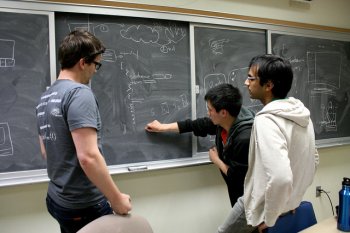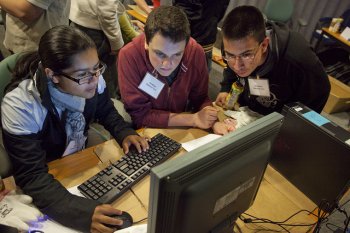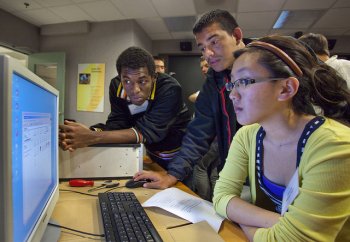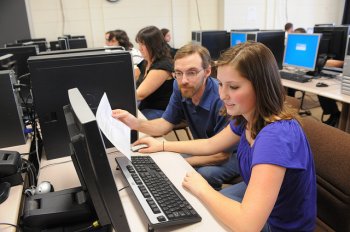

2. Computer Science Teachers Association (CSTA)
As its name suggests, CSTA is a membership of educators dedicated to supporting and promoting the teaching of computer sciences. They work on a multitude of levels to pursue their goals – collaborating with educators, creating effective policies and standards, and providing reference materials, among other things.
CSTA has found that computer science in college has experienced an unfortunate decline in number of interested students. To combat this, CSTA is reaching out to administrations, generating interest in computer science at a young age, partnering with schools, and introducing students to potential computer science careers and college courses in order to increase the number of computer science degree-holding graduates.
3. Code.org
With their vision of expanding participation in computer sciences, Code.org believes in equal opportunity for students to learn about and become interested in the field. Their mission to get computer science included in core curriculum classes in schools. Code.org works toward that goal by designing courses, partnering with similar organizations, training teachers, partnering with large school districts, helping change government policies, and breaking stereotypes.
Code.org works toward that goal by designing courses, partnering with similar organizations, training teachers, partnering with large school districts, helping change government policies, and breaking stereotypes.
On their website, Code.org has numerous engaging and entertaining courses, games, art, and resources for students to learn how to code. They report 6, 339, 186, 734 lines of computer code have been written by their students.
4. FIRST Tech Challenge
As a STEM-focused community, FIRST seeks to engage children with a love of science, technology, and math at a very young age. Through mentoring programs, competitions, and scholarship opportunities, FIRST not only promotes an interest in STEM fields, but also encourages curiosity, self-confidence, leadership, and other life skills.
FIRST has competition programs for kids from kindergarten to senior year. The Junior FIRST LEGO League (Jr. FLL) and FIRST LEGO League (FLL) encourages the kids’ natural curiosity and funnels it towards exploring math and science by using LEGO blocks. The programs engage students with real-life tech challenges in which they have to work together and build a LEGO robot to solve a task. FIRST Tech Challenge (FTC) is for high school students, in up to teams of 10, in which they design, create, and program a robot to compete against other teams. The FIRST Robotics Competition (FRC) is an intense challenge in which teams of 25 or more must build and program a task-oriented robot under strict rules, limited resources, and a time limit. Both FTC and FRC participants qualify for scholarships.
The programs engage students with real-life tech challenges in which they have to work together and build a LEGO robot to solve a task. FIRST Tech Challenge (FTC) is for high school students, in up to teams of 10, in which they design, create, and program a robot to compete against other teams. The FIRST Robotics Competition (FRC) is an intense challenge in which teams of 25 or more must build and program a task-oriented robot under strict rules, limited resources, and a time limit. Both FTC and FRC participants qualify for scholarships.
5. Girls Who Code
 There is an undeniable gender gap in STEM fields; Girls Who Code is determined to change that. By working with schools, this organization is working hard to educate and inspire female students to pursue their interest in computing. They engage with girls to ensure they are properly equipped with the right skills and tools; Girls Who Code is making sure that students are exposed to computer science.
There is an undeniable gender gap in STEM fields; Girls Who Code is determined to change that. By working with schools, this organization is working hard to educate and inspire female students to pursue their interest in computing. They engage with girls to ensure they are properly equipped with the right skills and tools; Girls Who Code is making sure that students are exposed to computer science.
Their Summer Immersion Program provides participants with seven-week long intensive instruction in robotics, web design, and mobile development. The program features field trips to technology companies and academies, demonstrations, workshops, and speeches from leading female engineers and entrepreneurs. The program seeks to instill a lifelong love of STEM learning in participants, as well as encourage them to pursue computer science in college and careers.
Get College Planning Tips From the Experts
Join thousands of students & parents learning about finding the right college, admissions secrets, scholarships, financial aid, and more.
INTERESTING VIDEO












